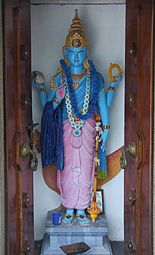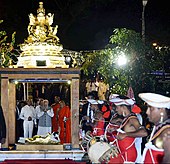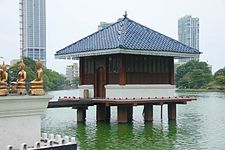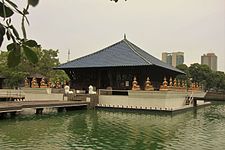Seema Malaka
| Seema Malaka | |
|---|---|
සීමා මාලකය | |
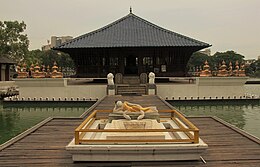 Seema Malaka in May 2016 | |
| Religion | |
| Affiliation | Buddhism |
| Deity | Lord Buddha smaller shrines dedicated to Guanyin, Kataragama deviyo, Vishnu, Shiva and Ganesha |
| Location | |
| Location | Beira Lake, Sir James Pieris Mawatha, Colombo |
| Country | Sri Lanka |
| Geographic coordinates | 6°55′3.4428″N 79°51′11.7252″E / 6.917623000°N 79.853257000°E |
| Architecture | |
| Founder | Hikkaduwe Sri Sumangala Thera, Devundera Sri Jinaratana Nayake Thera |
| Completed | Late 19th century |
| Website | |
| gangaramaya | |
| Part of a series on |
| Buddhism |
|---|
 |
Seema Malaka (Sinhala: සීමා මාලකය) is a Buddhist temple in Colombo, Sri Lanka. The temple is mainly used for meditation and rest, rather than for worship. Situated in the Beira Lake, the temple was originally constructed in the late 19th century.[1][2][3] Seema Malaka is a part of the Gangaramaya Temple and is situated few hundred meters to its east.[4][5][6]
History
[edit]Seema Malaka was originally constructed in the late 19th century. The original structure slowly sank into the water in 1970s. In 1976, Sri Lankan architect Geoffrey Bawa was brought in to redesign and construct the temple, which stands today.[4][7][8] The reconstruction was funded by a Sri Lankan Muslim businessman, S. H. Moosajee, and his wife, in memory of their son Ameer S. Moosajee.[5][9]
Construction
[edit]Seema Malaka was redesigned by Geoffrey Bawa in 1976 after the original structure slowly sank; the temple is in the middle of the Beira Lake and the design was inspired by the ancient monasteries in forests of Anuradhapura and Ritigala.[4][5][7]
The temple is constructed on three platforms over water, which are connected to the mainland and with each other by pontoon bridges. The temple's main roof is covered with blue color tiles and the temple is made from collected spindles and handrails in wooden finishes. The architecture of the edifice resembles the Kandyan era. All three platforms have numerous seated Buddha statues displaying different mudras. The main (central) platform houses wooden paneled shelter for meditation. On one of the side platforms is the Bodhi Tree which was grown from a branch of the Jaya Sri Maha Bodhi tree in Anuradhapura. The four corners of the side platform have small shrines dedicated to Shiva, Vishnu, Kataragama deviyo and Ganesha.[2][4][5][9][10] A shrine dedicated to Guanyin is found at the entrance to the temple and another statue of Guanyin is also found within the temple complex.
Picture gallery
[edit]-
Buddha statue under the Bodhi Tree
-
Main hall of the temple
-
Buddha footprint at temple entrance
-
Vishnu statue in the temple
-
Guanyin statue in front of main temple hall
-
Guanyin shrine at the entrance to the main temple hall
-
Buddha statues in different Mudras towards South side of the temple
-
North side platform
-
Main hall with Bodhi Tree in background
Location
[edit]Seema Malaka is situated in the Beira Lake in Colombo, Sri Lanka. It is situated 34 kilometres (21 mi) south of Bandaranaike International Airport and 2 kilometres (1.2 mi) south-east of Galle Face Green.[11]
References
[edit]- ^ "About us". Gangaramaya Temple website. Retrieved 19 May 2016.
- ^ a b "Seema Malaka Buddhist Temple". visitcolombo.com. Retrieved 19 May 2016.
- ^ "Seema Malakaya Meditation Centre". Lonely Planet. Retrieved 9 Aug 2016.
- ^ a b c d "The Seema Malaka & Gangaramaya Temples". My Sri Lanka Holidays. Retrieved 19 May 2016.
- ^ a b c d Guides, Rough (2 November 2015). "The Rough Guide to Sri Lanka". ISBN 9780241251263. Retrieved 9 Aug 2016.
- ^ Collectif; Auzias, Dominique; Labourdette, Jean-Paul (24 March 2014). "Sri Lanka 2014 Carnet de voyage Petit Futé (avec avis des lecteurs)". ISBN 9782746981126. Retrieved 9 Aug 2016.
- ^ a b "The Work Of Geoffrey Bawa". Geoffrey Bawa official website. Retrieved 9 Aug 2016.
- ^ "36 Hours in Colombo, Sri Lanka". The New York Times. Retrieved 9 Aug 2016.
- ^ a b "The Seema Malaka Lake Temple". musukaikai.com. Retrieved 19 May 2016.
- ^ "A Place Rich In History". The Sunday Leader. Retrieved 9 Aug 2016.
- ^ "Location". Google Maps. Retrieved 19 May 2016.





